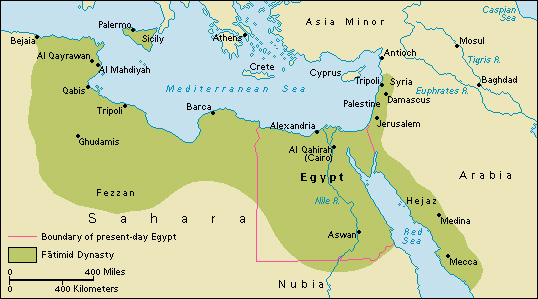Fātimid << FAT uh mihd >> dynasty was a line of Muslim rulers who held power from A.D. 909 to 1171. The rulers claimed descent from Fātimah, a daughter of the Prophet Muhammad, and her husband, Alī ibn Abī Tālib, a cousin of the Prophet. The dynasty and its followers belonged to the Shī`ah branch of Islam and to a sect called the Seveners. In 909, they gained control over land that had been held by the larger group of rival Sunni Muslims and rose to power in north Africa. At various times, the Fātimid empire included Sicily, Syria, and parts of Arabia and Palestine.

For many years, the Fātimids made their capitals in what are now the cities of Al Qayrawan and Al Mahdiyah, Tunisia. But after winning control of Egypt in 969, they founded a new capital, Cairo. There, they built many beautiful buildings and established al-Azhar University. Today, this university is one of the oldest universities in the world and the most influential religious school in Islam. The Fātimids also established great libraries in Cairo and in Tripoli, Lebanon.
The Fātimid rulers were good leaders, but internal conflict eventually broke the dynasty apart. Members of the court struggled for power in the 1160’s, and Nūr al-Dīn, a Syrian leader, became involved. The last Cairo ruler asked Nūr al-Dīn for protection against an invasion in 1168. Nūr al-Dīn sent a strong force that included Saladin, a soldier who overthrew the Fātimid dynasty in 1171. Today, Shī`ites (followers of Shī`ah Islam) who remain loyal to the Fātimid dynasty are known as Ismā`īlīs.
